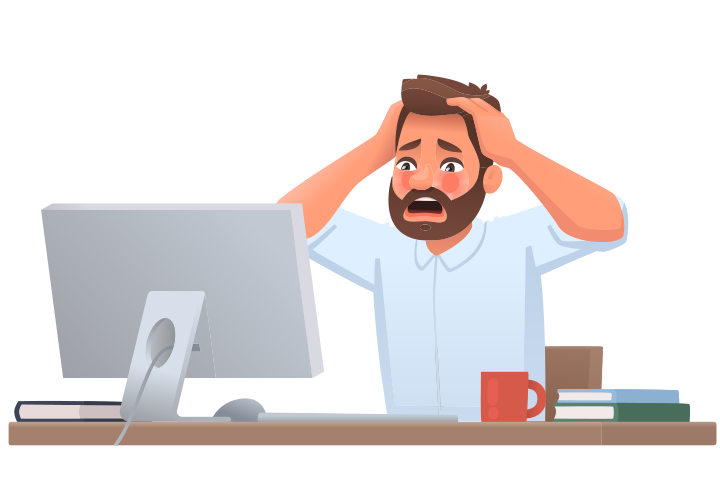Almost everyone experiences stress at some point in their lives. But not everyone responds the same way to stress – or seeks help the same way.
There is a continuing stigma around mental health in general for men. One study from the National Institute of Mental Health shows only 40% of men with a reported mental illness get help compared to 52% of women.
How many men are stressed?
The Stress in America poll shows the average stress level for U.S. adults last year was five out of 10. One means “little to no stress" and 10 is a “great deal of stress." Almost 25% of people polled rated their average stress between eight and 10 – up from 19% in 2019.
Here's the breakdown between women and men who said they felt completely overwhelmed:
Women Men
Ages 18-34 62% 51%
Ages 35-44 48% 48%
Ages 45-64 27% 21%
Ages 65+ 9% 8%
Experts say men don't always admit to being stressed, so the numbers may be even higher.

Toughening up Isn’t The Answer
Men may feel societal or cultural expectations to “man up" when faced with stress. Experts say it can be dangerous to avoid sharing feelings instead of getting help.
A World Health Organization report found that three times more men die by suicide than women. While suicide is a complicated issue with many unknowns, experts say gender roles may be a contributing factor.
Boys, from the time they're young kids, are encouraged to be strong and not cry. This may teach them it's better not to share their feelings, especially when those feelings could be linked to “weakness."
The Male Brain Under Stress
Suicide is the most devastating potential effect of untreated stress, but it's not the only one. According to the American Psychiatry Association, men and women respond differently to stress because of their unique brain wiring. While women with chronic stress may be at risk for depression, men may be more likely to cope with stress by drinking or using drugs, leading to substance use issues.
Studies also show men may respond to serious stress by:
- developing memory issues
- feeling increased aggression or agitation
- feeling restlessness or having issues sleeping
- having trouble concentrating
General physical symptoms of stress for both men and women can include:
- chest pain or racing heart
- headaches or dizziness
- muscle tension or body aches and pains, especially in the back, shoulder and neck
- clenched jaw or teeth grinding
- digestive issues like nausea, stomachaches and diarrhea
- fatigue or sleep problems
- high blood pressure
- sexual issues
- increased colds and illness
What You Can Do
Here are healthy ways to manage stress:
- Get active. Exercise can relieve stress by increasing endorphins, the “feel-good" hormones, and reducing adrenaline and cortisol, the stress hormones.
- Get enough sleep. If you're not sleeping, your brain doesn't have time to rest and recharge. If stress is keeping you awake, talk to your doctor about relaxation techniques or sleep aids.
- Eat healthy. Being stressed may make you want to “comfort eat," but sticking to healthy foods can provide the energy needed to power through stressful times
- Take a time out. Prayer, deep breathing, yoga or meditation can all help your brain and body reset during times of extreme stress.
Resources for TRS-ActiveCare and TRS-Care Standard
Managing your stress may take more than a few lifestyle changes. If your stress is affecting your physical and mental health, don't be afraid to get help. Here's how.
Provider Finder®
Make an appointment with your Primary Care Provider. Talking to your PCP is a good first step. They can discuss treatment options and give you a referral if needed.
Mental Health Care
See a therapist. A mental health professional who's skilled in stress management can teach you new skills for coping with current and future challenges. You have in-person, virtual and digital mental health care coverage.
Headway
Use Headway to find a therapist quickly and easily. You can get same-day matching with in-network providers who have openings within 48 hours.
Teladoc™
Make a virtual appointment with a licensed therapist, psychologist or psychiatrist with Teladoc. Care is available to you and your covered participants aged 13 and older. Appointments are at no added cost for TRS-ActiveCare Primary and TRS-ActiveCare Primary+ participants.
$0 Health Coaching
Work one-on-one with a credentialed health expert to help manage your stress. This service is available at no added cost.
Well onTarget®
Access self-management programs, tips and resources to help you manage stress. Videos, podcasts, 12-week programs and other tools are available anytime, day or night.
Learn to Live
Access digital programs anytime, anywhere for stress, anxiety, depression, insomnia and more.
Get 24/7 Live Help
Connect with a Personal Health Guide. Call 1-866-355-5999 or chat in the BCBSTX App 24/7. A PHG can help you find a provider and even make an appointment for you. Be sure to mention you're looking for mental health care.
.

Resources for TRS-Care Medicare
Provider Finder®
Search to find an in-network doctor, hospital or other health care provider in your area. Remember, your plan covers one physical exam and one wellness visit per calendar year. You can ask your provider to combine the visits into one convenient annual care appointment.
Virtual Doctor Visit
See a doctor anytime using live video chat from your computer, tablet or smartphone. With Virtual Doctor Visits, you can ask questions, get a diagnosis or even get medication prescribed and sent to your pharmacy. All you need is a strong internet connection. Consider setting up an account with a Virtual Doctor Visit provider so you're ready when it's time to make an appointment.
Ways to access Virtual Doctor Visits:
1. On your computer, visit uhcvirtualvisits.com and click on Choose a Medical Provider 2. On your tablet or smartphone:
- Download the American Well (Amwell) app
- Download the Doctor on Demand app
- Download the Teladoc app or call 1-855-615-8335 to set up an account and request a visit by phone.
Optum Behavioral Health
Optum Behavioral Health has more than 87,000 network providers offering inpatient and outpatient services such as therapy, behavioral health assessment and medication management. To start, call the behavioral health number on your member ID card or visit yourmember website and select “Find a Provider.”.
Mental Health Virtual Visits
Support is available for ED-related mental health issues such as depression, anxiety and stress. Connect with a mental health expert on your computer, tablet or smartphone. Visit VirtualVisitsMentalHealth.uhc.com to select a health care provider. They can evaluate and treat conditions such as depression and anxiety, and address substance use concerns.